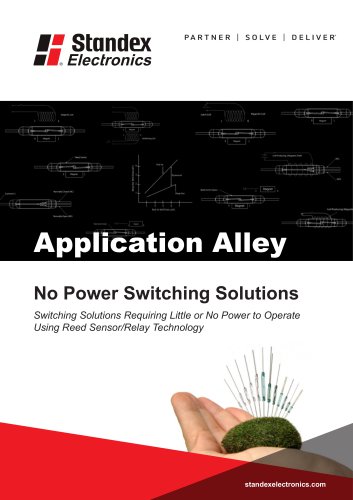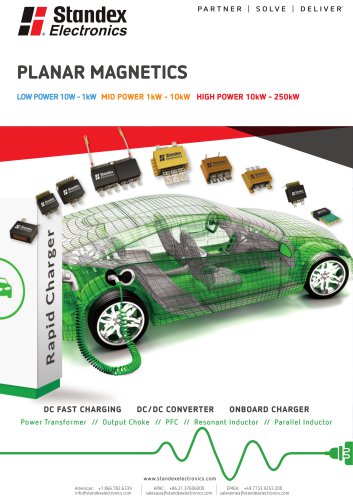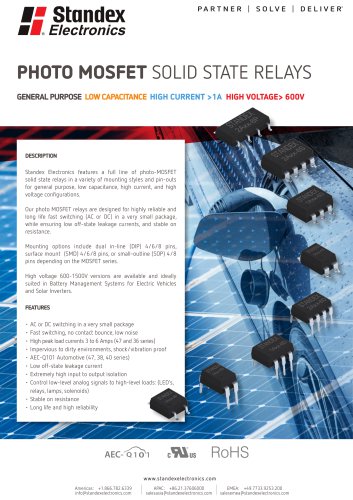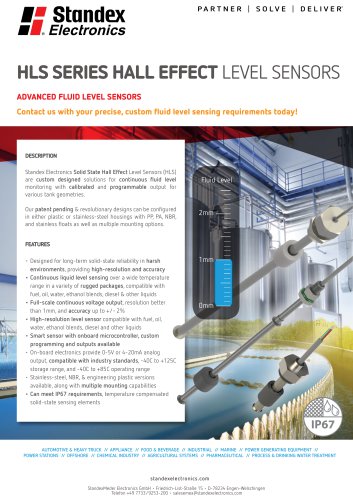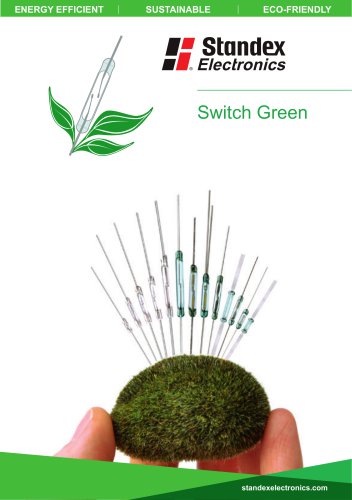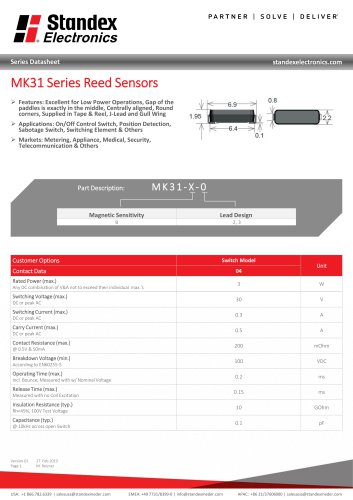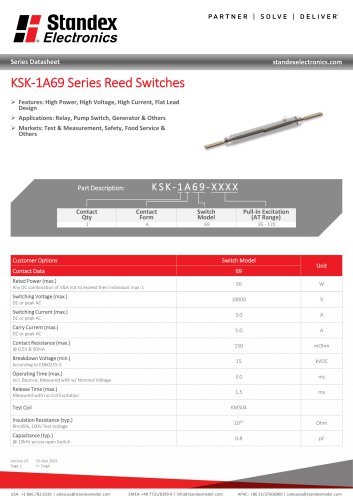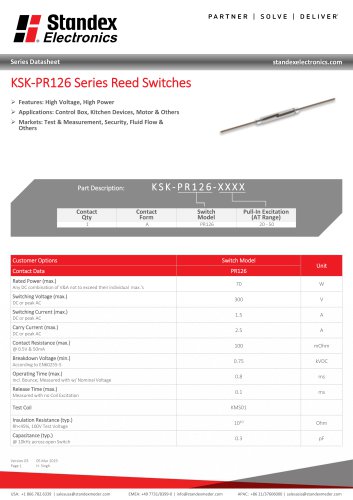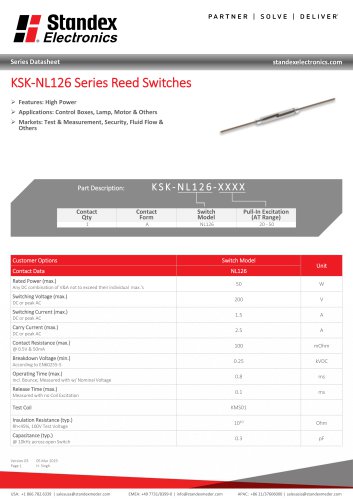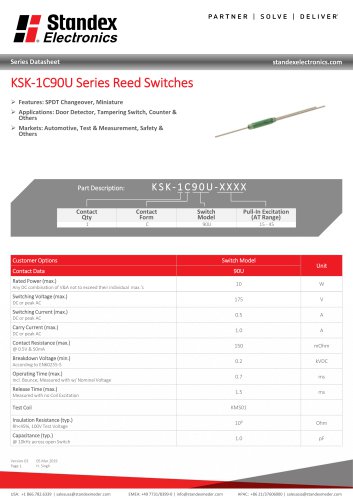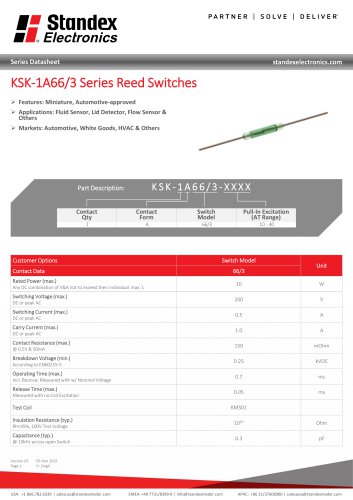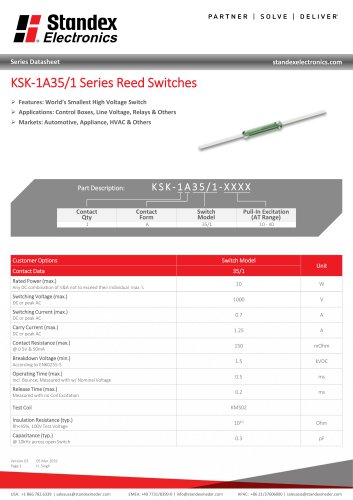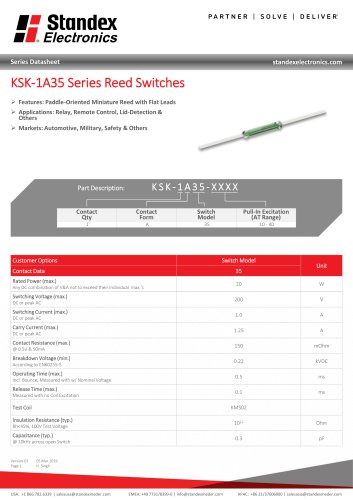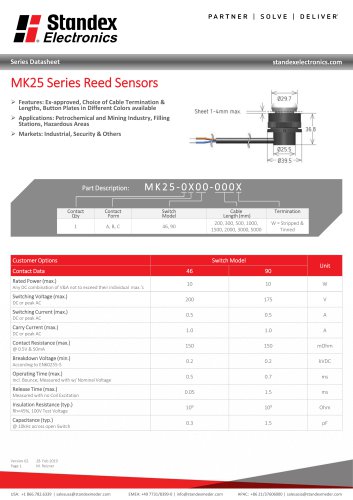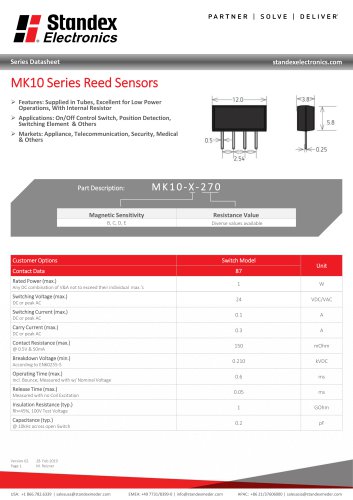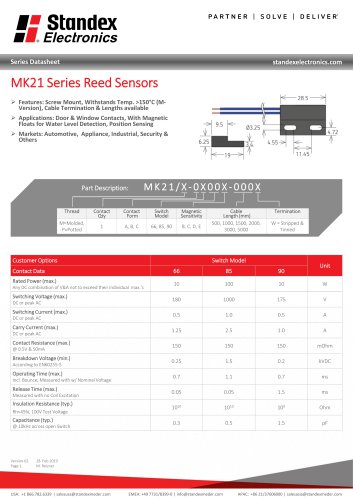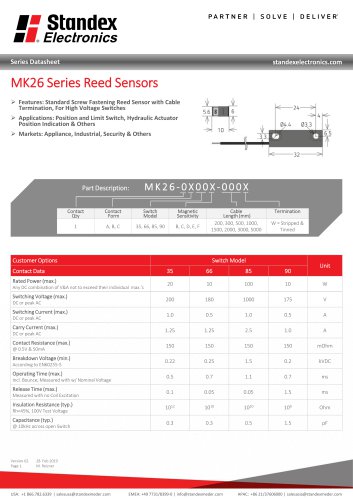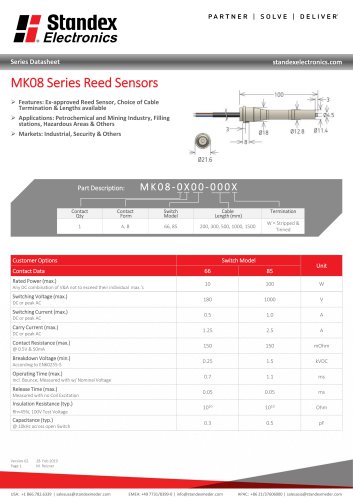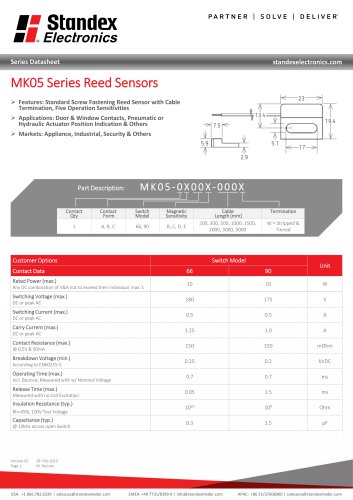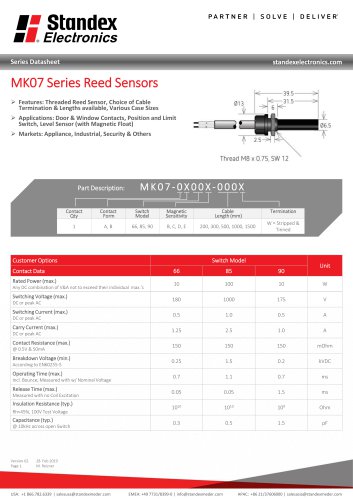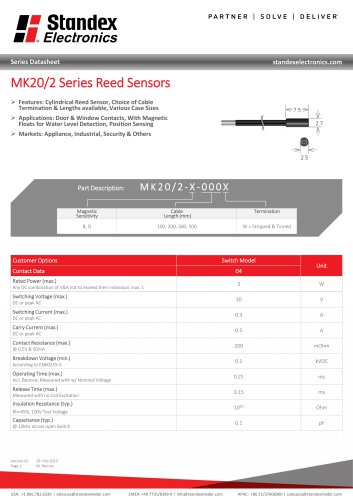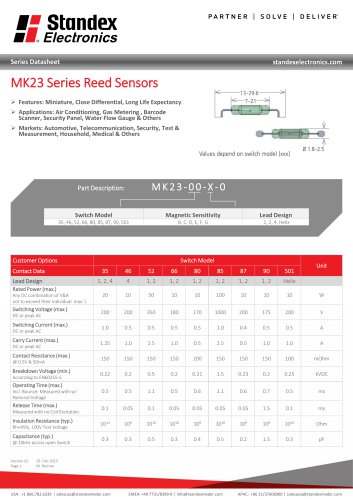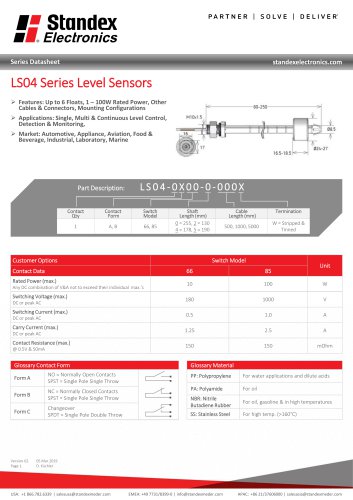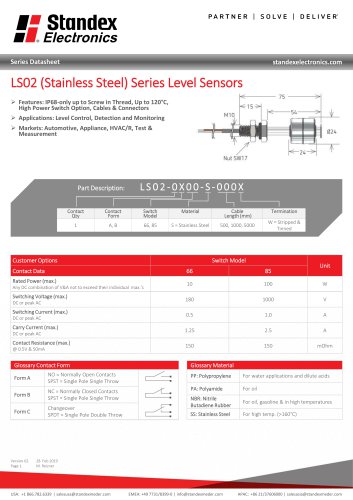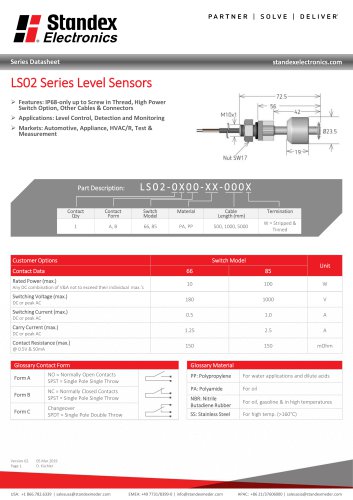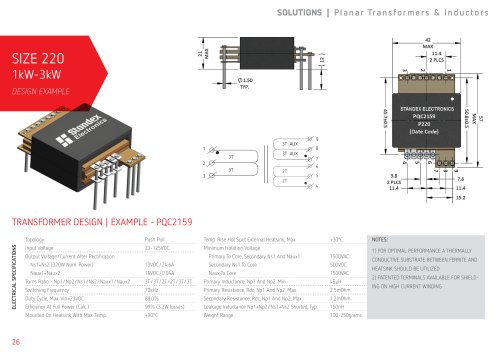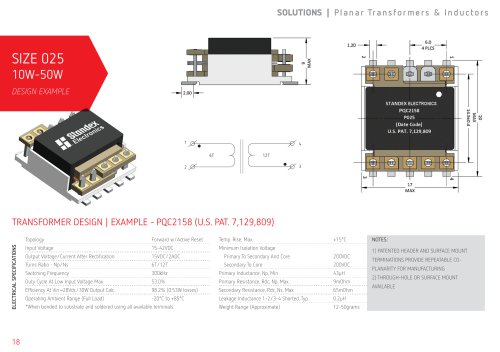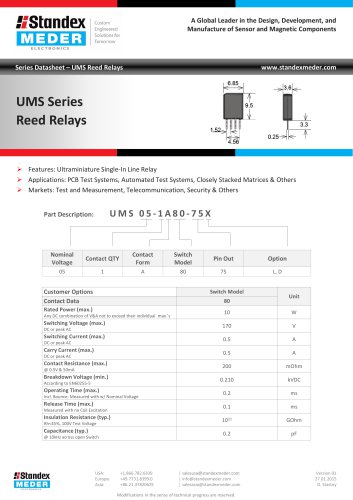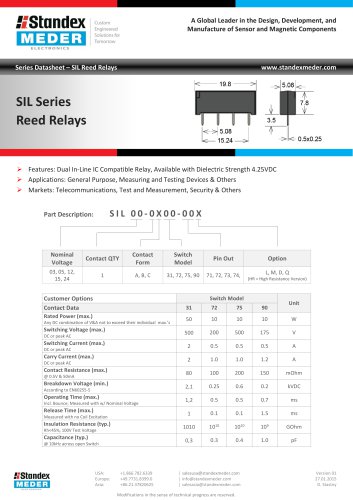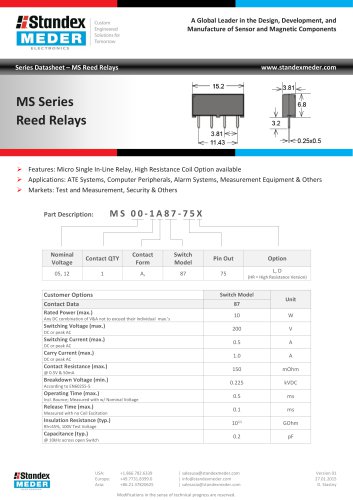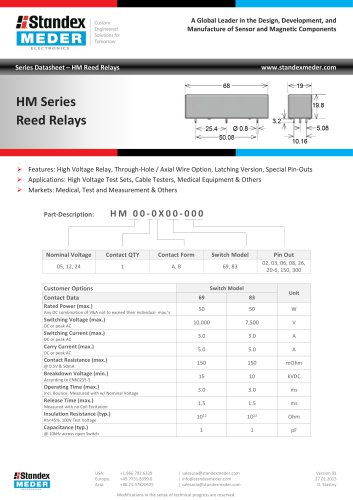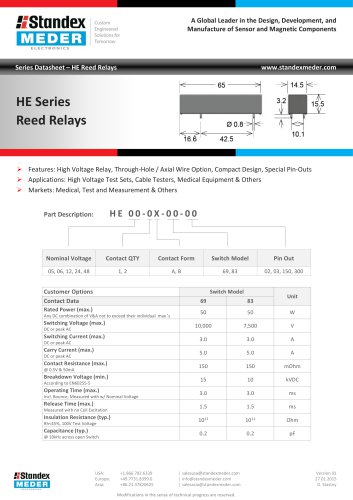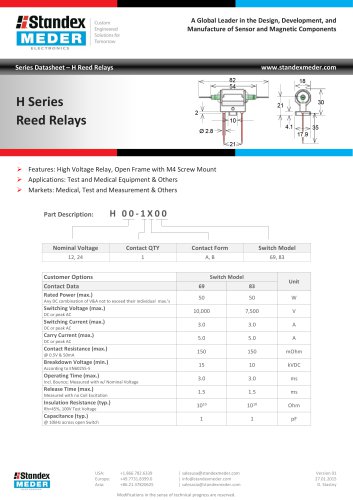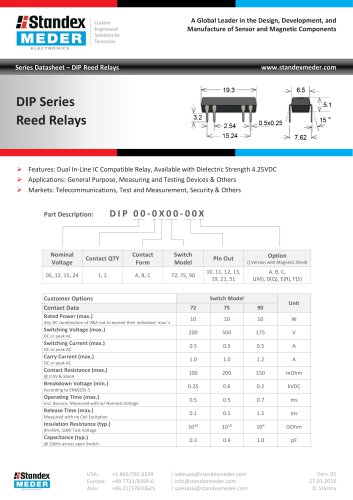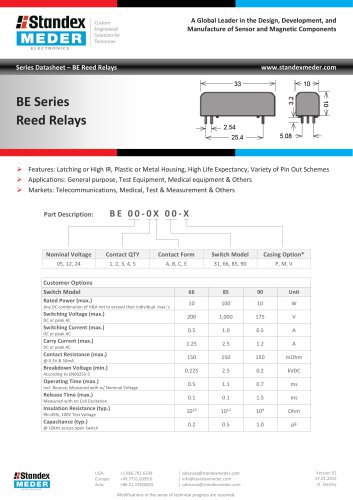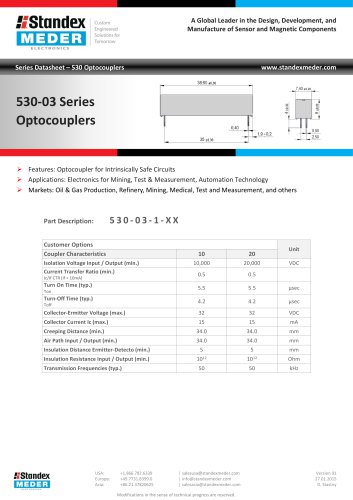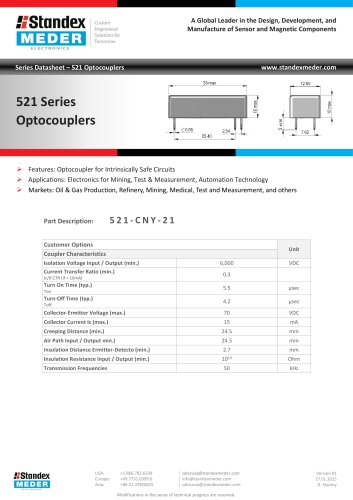 Website:
StandexMeder Electronics GmbH
Website:
StandexMeder Electronics GmbH
Group: Standex Electronics
Catalog excerpts
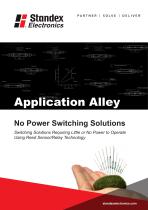
Application Alley No Power Switching Solutions Switching Solutions Requiring Little or No Power to Operate Using Reed Sensor/Relay Technology
Open the catalog to page 1
Application Alley Switching Solutions Requiring Little or No Power to Operate Using Reed Sensor/Relay Technology Introduction Power consumption in today’s electronic market is a concern with the dramatic increase in the use of portable electronic gadgetry. Power hungry components are rapidly being designed out in favor of power efficient products. Normally closed (Form B) Reed Sensors and Reed Relays draw zero power in their normally closed states. A latching Reed Relay uses minimal power for its operation in ‘setting’ or ‘resetting’ the contact states (bi-stable); and for that reason have...
Open the catalog to page 2
Application Alley Switching Solutions Requiring Little or No Power to Operate Using Reed Sensor/Relay Technology Form C Reed Switch Another type of Reed Switch is the single pole double throw (SPDT) or Form C Reed Switch (see Figure 3). Figure 3. Form C Reed Switch in its un-energized position. In Figure 3, no magnetic field is present therefore the common contact maintains its connection to the normally closed contact. The Reed Switch draws no power while in its normally closed state. When a magnetic field is applied, the Reed Relay draws 100% power while the common reed element swings...
Open the catalog to page 3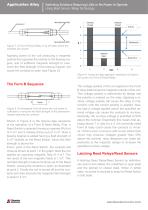
Application Alley Switching Solutions Requiring Little or No Power to Operate Using Reed Sensor/Relay Technology Figure 7. A Form B Reed Relay in its off state where the contacts are closed. Applying power to the coil producing a magnetic polarity that opposes the polarity to the biasing magnet, and of sufficient magnetic strength to overcome the field strength of the biasing magnet, will cause the contacts to open (see Figure 8). Figure 9. A step-by-step approach showing a full operation cycle of a Form B Reed Relay. Figure 8. An energized Form B where the coil power is sufficient to...
Open the catalog to page 4
Application Alley Switching Solutions Requiring Little or No Power to Operate Using Reed Sensor/Relay Technology Latching is made possible by the natural hysteresis that exists between the operate (Pull-in) and release (Drop-out) points of the Reed Switch (See Figure 10). As shown in Figure 10, the higher the operate point the larger the hysteresis. The larger the hysteresis, the easier it is to establish the latch and unlatch points from a design standpoint. A permanent magnet is required to bias the Reed Switch allowing it to operate in the latching mode. This will be seen in the...
Open the catalog to page 5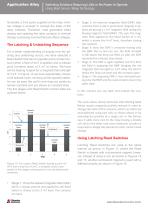
Application Alley Switching Solutions Requiring Little or No Power to Operate Using Reed Sensor/Relay Technology Generally a 2ms pulse supplied at the relay nominal voltage is enough to change the state of the relay contacts. Therefore, heat generated when closing and opening the relay contacts is minimal thereby producing minimal thermal offset voltages. The Latching & Unlatching Sequence For a better understanding of exactly how the latching and unlatching occurs, we have selected a Reed Switch that has an operate point (contact closure) when a field of 4mT is applied; and a release point...
Open the catalog to page 6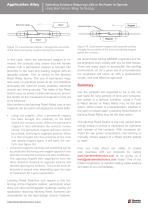
Application Alley Switching Solutions Requiring Little or No Power to Operate Using Reed Sensor/Relay Technology Figure 15. A permanent magnet is brought into proximity of the reed and biasing magnet closing the contacts. Figure 16. A permanent magnet with opposite polarity brought into proximity of the reed and biasing magnet opens the contacts. In this case, when the permanent magnet is removed, the contacts stay closed and will remain closed until a permanent magnet is brought into proximity to the reed and biasing magnet with an opposite polarity. This is similar to the latching Reed...
Open the catalog to page 7
About Standex Electronics Our reed switch-based solutions include KOFU, MEDER and KENT brand reed switches, as well as a complete portfolio of reed relays, and a comprehensive array of fluid level, proximity, motion, water flow, HVAC condensate, hydraulic pressure differential, capacitive, conductive and inductive sensors. Our magnetic offerings include planar, Rogowski, current, and low- and high-frequency transformers and inductors. For more information on Standex Electronics, please visit us on the web at standexelectronics.com You will also find our detailed data book under the...
Open the catalog to page 8All StandexMeder Electronics GmbH catalogs and technical brochures
-
Magnetic Floats
2 Pages
-
Activate Distance
40 Pages
-
Switch Green
6 Pages
-
Databook Reed Technology_EN
100 Pages
-
MK31 SERIES REED SENSOR
2 Pages
-
Product Line Brochure Magnetics
24 Pages
-
MK25 SERIES REED SENSOR
3 Pages
-
MK28 SERIES REED SENSOR
2 Pages
-
MK10 SERIES REED SENSOR
2 Pages
-
MK02-6 SERIES REED SENSOR
2 Pages
-
MK06 SERIES REED SENSOR
3 Pages
-
MK27 SERIES REED SENSOR
3 Pages
-
MK21 SERIES REED SENSOR
3 Pages
-
MK26 SERIES REED SENSOR
3 Pages
-
MK08 SERIES REED SENSOR
3 Pages
-
MK02 SERIES REED SENSOR
3 Pages
-
MK13 SERIES REED SENSOR
3 Pages
-
MK05 SERIES REED SENSOR
3 Pages
-
MK04 SERIES REED SENSOR
3 Pages
-
MK07 SERIES REED SENSOR
3 Pages
-
MK03 SERIES REED SENSOR
2 Pages
-
MK14 SERIES REED SENSOR
3 Pages
-
MK18 SERIES REED SENSOR
2 Pages
-
MK20/2 SERIES REED SENSOR
2 Pages
-
MK01 SERIES REED SENSOR
3 Pages
-
MK30 SERIES REED SENSOR
2 Pages
-
MK15 SERIES REED SENSOR
2 Pages
-
MK23 SERIES REED SENSOR
4 Pages
-
MK22 SERIES REED SENSOR
2 Pages
-
MK17 SERIES REED SENSOR
2 Pages
-
MK16 SERIES REED SENSOR
2 Pages
-
MK24 SERIES REED SENSOR
2 Pages
-
LS05 Series Data Sheet
2 Pages
-
LS04 Series Data Sheet
2 Pages
-
LS03 Series Data Sheet
3 Pages
-
LS02-S Series Data Sheet
2 Pages
-
LS02 Series Data Sheet
2 Pages
-
LS01 Series Data Sheet
2 Pages
-
PQ32 Planar Inductors
1 Pages
-
UMS SERIES REED RELAY
3 Pages
-
SIL SERIES REED RELAY
3 Pages
-
SIL RF SERIES REED RELAY
3 Pages
-
SIL HV SERIES REED RELAY
3 Pages
-
RM05-8A-S SERIES REED RELAY
3 Pages
-
MS SERIES REED RELAY
3 Pages
-
MRX SERIES REED RELAY
3 Pages
-
LI SERIES REED RELAY
3 Pages
-
KT SERIES REED RELAY
3 Pages
-
HM SERIES REED RELAY
3 Pages
-
HI SERIES REED RELAY
3 Pages
-
HF SERIES REED RELAY
3 Pages
-
HE SERIES REED RELAY
3 Pages
-
H SERIES REED RELAY
2 Pages
-
DIP SERIES REED RELAY
3 Pages
-
DIL SERIES REED RELAY
3 Pages
-
CRR SERIES REED RELAY
3 Pages
-
CRF SERIES REED RELAY
3 Pages
-
BT SERIES REED RELAY
3 Pages
-
BE SERIES REED RELAY
3 Pages
-
Optocoupler 567 Series
2 Pages
-
Optocoupler 535 Series
2 Pages
-
Optocoupler 530-03 Series
2 Pages
-
Optocoupler 530-70 Series
2 Pages
-
Optocoupler 528 Series
2 Pages
-
Optocoupler 525 Series
2 Pages
-
Optocoupler 522 Series
2 Pages
-
Optocoupler 521 Series
2 Pages

